23 Ways to Measure Progress Without Stepping on a Scale
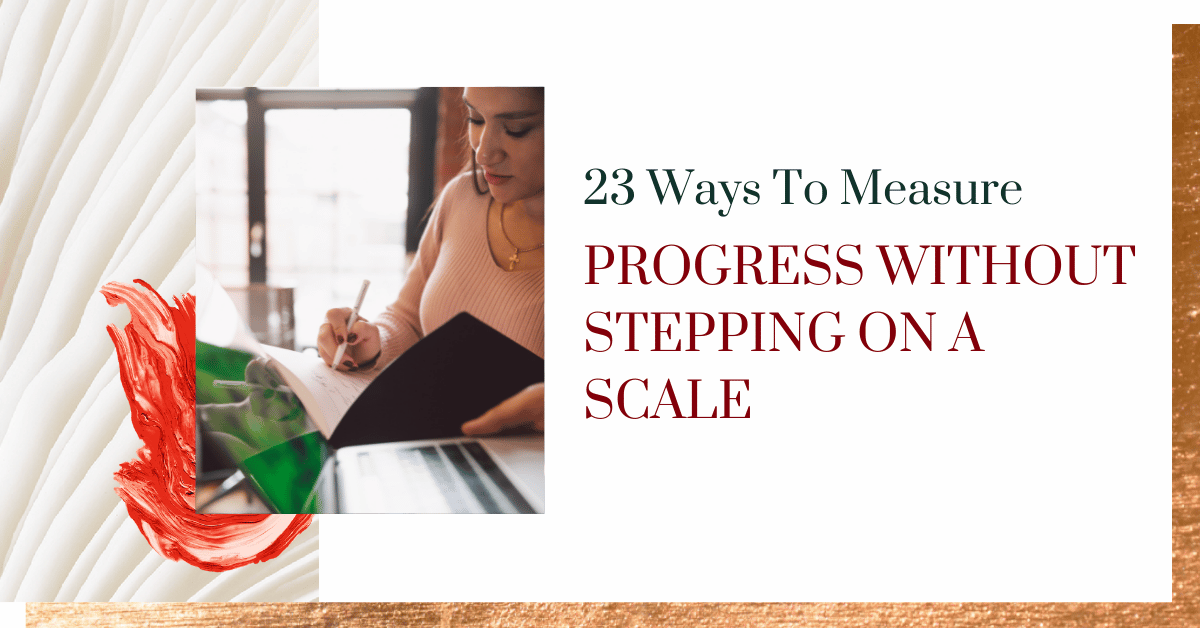
Last week I talked about why you should never weigh yourself. This week I’m bringing you part 2 of this series and am showing you ways to measure your progress (that aren’t weight loss). So get ready to toss your scale and start tracking your progress this way instead.
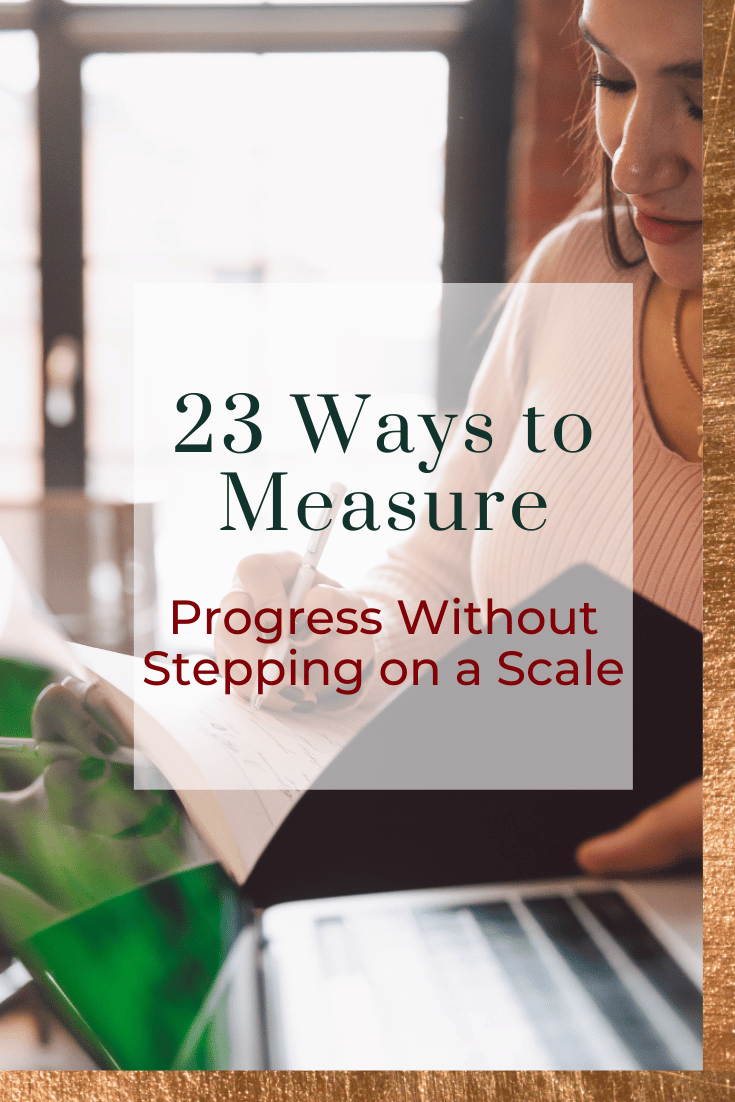
For almost 10 years, I stepped on the scale every week. The number that I saw would dictate how I felt. If I lost weight or maintained my weight, I’d breathe a sigh of relief – I could continue to eat as I had been and I could feel good about myself. But if I gained any weight – even just a pound or two – my mood would turn and I’d feel guilty, sad, gross, and ashamed. Then I’d start plotting what I’d have to restrict to make sure the weight didn’t creep up more. This is not a way to live.
Unlike dieting, learning how to eat intuitively is not measured by pounds lost or inches shed. In fact, weighing yourself can hinder the Intuitive Eating process. When we use the scale as a measure of progress, we promote unhealthy attitudes towards food, eating, body image and self-worth. Plus, weight does not dictate health (never mind the fact that whether or not your body loses weight is not up to you, or to me, it’s up to your body). This is why I practice from a weight-neutral and weight-inclusive perspective, meaning I’m concerned with your thoughts and behaviors, not the number on the scale.
But this leads to a very common question: if you’re not weighing yourself, how do you gauge improvements?
To give you some ideas, here are 23 ways to measure your progress without ever stepping on a scale.
1. You are more attuned to your hunger cues. You are able to notice when your body feels hunger, and honor that hunger by feeding it. Even if it’s late at night, or it’s “only” been 2 hours since your last meal, or if you think you already ate enough today – you trust your body when it tells you it’s hungry.
2. You feel your fullness. You’re able to figure out what “comfortably full” feels to you and, more often than not, finish eating when you get to that point. You discover which foods keep you full and which ones don’t.
3. You stress less about food. Instead of constantly thinking about food and what you’re going to eat, when you’ll eat and how much you’ll eat, you simply enjoy eating. Food doesn’t have control over you and your day isn’t dictated by how “good” or “bad” you eat.
4. You know which foods satisfy you (and which ones don’t). You’re able to discover which foods you find delicious and tasty. Maybe you experiment more in the kitchen and play with new recipes and foods. You stop eating unsatisfying foods that you used to think you “should” eat, and start eating things you actually enjoy.
5. You eat more mindfully. You’re able to sit with your food and really savor it. You eat with fewer distractions and more focus on the food including how it smells, how it tastes and how it makes you feel. You practice pausing before eating to ensure you are eating intentionally and not reactively.
6. You eat a wider variety of foods. Years of dieting may have caused your list of “safe” or “good” foods to be pretty short. Progress can mean eating a wider variety of foods, including food that you previously considered “off limits”.
7. You let go of your inner food police. You start to make food choices based on hunger and fullness, health, and satisfaction, rather than diet rules, guilt or deprivation. You are interested in healthy eating with no hidden agenda and you can eat all kinds of foods without feeling guilty of judging yourself.
8. You find new ways to cope with emotions. Food is no longer your only coping mechanism. You develop a toolbox full of coping mechanisms and put them into practice when you feel stressed, sad, anxious, bored, etc.
9. You have more energy. As you become more in tune with your body you’re able to recognize what foods make you feel your best. You’ll find that you have more energy consistently throughout the day and you’ll figure out which foods help your energy levels and which ones don’t. When you’re in touch with your body’s feelings of hunger and fullness you’ll end up better fueling your body throughout the day and will feel more energetic.
10. You stop labeling foods as “good” or “bad”. Progress means no more categorizing foods in a black and white fashion. Instead, you make peace with food and allow all kinds of foods to fit in your diet (without guilt).
11. You can turn down food that is offered to you. If you are a refuse-not unconscious eater, progress is being able to turn down food when someone offers it to you. Progress can also be turning away free food or not just eating something because it’s there.
12. You stop mindlessly snacking. If you identified as an unconscious eater, progress will be less mindless eating, snacking or grazing between meals. Instead, you honor your hunger if and when you’re hungry between meals but do so mindfully. You may also find that by eating more filling and satisfying meals you don’t feel the urge or need to snack between meals as frequently.
13. You are able to leave food on your plate. Waste-not eaters have trouble leaving food behind, whether it’s at home or at a restaurant. If this is you, measure progress by your ability to stop eating when you are comfortably full – whether or not there is still food left on your plate.
14. You binge/overeat less frequently. When you break free from the diet mentality and allow yourself all foods, you’ll start to notice that you aren’t overeating or binging as often. As one of my clients said “I got chips at lunchtime. Before it would’ve been an ordeal, and I would have been sneaking chips all afternoon, but now I grabbed a handful, enjoyed them and moved on.”
15. Your cravings decrease. When your body knows and trusts that you will a) feed it when it’s hungry and b) not restrict or make any foods off limits, your cravings will start to subside. You may even find yourself less interested in food.
16. You can keep that “trigger food” in your house. Whatever that “off-limits” food was for you (i.e. chips, cereal, peanut butter, ice cream, cookies, etc) progress comes when you can keep it in your house without feeling the need to binge on it. You might even find that you forget it’s even there and go days or weeks without eating it.
17. You can stop eating when something no longer tastes good. Since you’re eating more mindfully and really tasting the food, you’re able to recognize when something doesn’t taste good and decide to not eat it or not finish it. One client of mine swore she loved a certain brand of cookie. Then she tried mindfully eating them and realized that they actually didn’t taste very good at all!
18. You can eat all sorts of foods without feeling guilty. No foods are off limits to you and you can eat whatever foods you want – including your previously “off limits” or “bad” foods – without feeling any guilt or shame. You eat them and then move on with your day.
19. You stop second-guessing your food choices. You’re able to feel confident with the foods you choose to eat and don’t spend time obsessing or thinking about food after the fact.
20. You can lift more weight. Improvements in strength are a great way to measure your progress. Maybe you can lift heavier weights at the gym, or do more reps, or pick up a heavy box that you couldn’t before.
21. Your flexibility improves. You may notice that your mobility and flexibility increases. Maybe you can get up from a chair or bed easier, or you can now bend down to touch your toes.
22. You exercise for fun, not punishment. You workout or move during the day because you enjoy it, not as penance for your eating. You find a form of exercise that you really enjoy and look forward to whether that’s walking, running, biking, swimming, dancing, boxing, yoga, etc.
23. You have more confidence. As you start to work on improving your body image and self-worth, you’ll feel more confident. This confidence will bleed into how you act in your relationships, at your job, and in your daily interactions.
Rather than focusing on your weight, pursue health behaviors for their own sake. Focus on the changes you see in your behavior and your thoughts. It’s a process, and it will take time to undo all the diet mentality and food rules that have built up in your head over the years. Celebrate all your wins and successes – no matter how small – and write them all down somewhere you can reference. Over time they will build up until you get to the point where eating normally becomes actually normal, and you’ll reach a place of eating and caring for yourself intuitively – for life.
How do you measure your progress? I’d love to hear your thoughts in the comments section below!
Looking for more intuitive eating support?
Check out my Unapologetic Eating 101 Course, an online, self-paced program to liberate yourself from dieting and make peace with food and your body.
My team and I also offer virtual one-on-one support – you can check out our virtual intuitive eating nutrition coaching packages.
My book, Unapologetic Eating: Make Peace with Food and Transform Your Life, is also a great resource that includes information, research, and reflection prompts to help you move away from dieting and come back home to your body, so you can live your most unapologetic, liberated life.
Author Bio
This article was written and reviewed by Alissa Rumsey, MS, RD, CSCS, a registered dietitian and Certified Intuitive Eating Counselor. She specializes in weight-inclusive care, intuitive eating, body image healing, mindfulness, self-compassion, and healing from chronic dieting, disordered eating, and eating disorders. Alissa holds a Bachelor’s Degree in Nutrition and Exercise Science, and a Master’s Degree in Health Communications, and is also an NSCA Certified Strength and Conditioning Specialist.
4 Comments
Leave a Comment
share the love
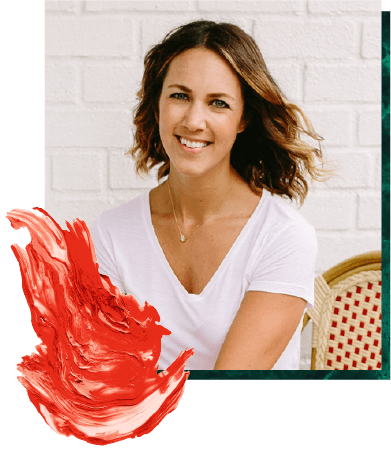
about
Alissa Rumsey, RD.
Alissa Rumsey, MS, RD, CDN, CSCS (pronouns she/her/hers) is a registered
dietitian, nutrition therapist, certified intuitive eating counselor, and the author of
Unapologetic Eating: Make Peace With Food and Transform Your Life. Alissa is
passionate about helping people reclaim the space to eat and live,
unapologetically.

A twice-a-month round-up of inspirational stories, lessons, practical tips and encouragement for living your most authentic, unapologetic life.
The Unapologetic Life
RECENT POSTS

The Unapologetic Life
A twice-a-month round-up of inspirational stories, lessons, practical tips and encouragement for living your most authentic, unapologetic life.






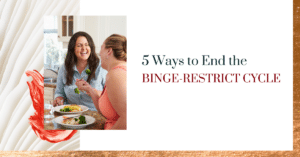
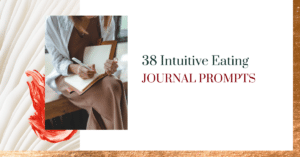
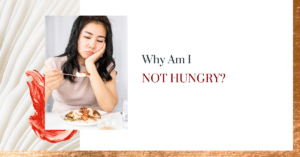
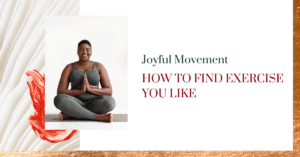
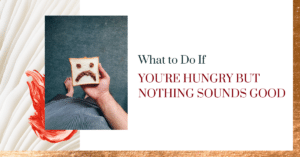
Thanks for this list of “measurments” – reading them in relation to my life and progress was really strengtening!
Thanks for the feedback Katarina, I’m happy to hear you found it helpful 🙂
Thank you. Alissa, for sharing this insight. I have been on my own personal journey which has taken me many, many years to go through hundreds of pounds (up and down), every diet on the planet, only to end up (washed up) on the shore line with an invitation to be free of diets and just live eating healthier… I chose that route, today the weight, inches, and other metrics can no longer define me… I pursue life… healthier living… healthier choices… better alternatives… and am happier doing it. Your article validated many principles that have marked me and ones that I teach others. Blessings!!
Thanks for sharing Doris, I’m glad to hear this was validating!